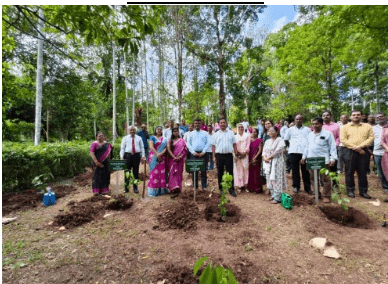In a push for self-reliance and ecological farming, the Andaman & Nicobar Administration has rolled out an ambitious spice cultivation initiative under the name SPICE PRAVAH, Spice Promotion by Integrated Cultivation & Enhancement. Launched on July 31 at the Organic Horticulture Farm in Sippighat, the campaign aims to turn the Union Territory into a major contributor to the country’s spice production.
The campaign was inaugurated with the ceremonial plantation of cinnamon saplings by top administrative officials, including the Chief Secretary, who emphasized the need to reduce spice imports and promote indigenous cultivation. Cinnamon, nutmeg, and black pepper have been identified as the core crops of the campaign, with a special focus on tree-based spices that promise long-term yields and value addition.
A total of 78,160 saplings were distributed and planted in the first phase, covering 40 hectares of farmers’ fields. A second phase involving another 25 hectares in government farms with 47,400 saplings is expected to begin within the next three months. These initial figures point to a large-scale effort to expand the area under spice cultivation and engage both progressive farmers and rural communities.
The campaign is not merely about planting spices but represents a multi-pronged approach. According to the Agriculture Department, the plan includes development of Integrated Nurseries and Demo Farms, technical training to farmers, and a robust support structure for value-added spice products. A dedicated team trained at the Indian Institute of Spices Research (IISR), Kozhikode, will steer the initiative, which includes branding, Geographical Indication (GI) tagging, and marketing strategies aimed at domestic and international markets.
Officials noted that the plantations are being carried out in eight zones across the Islands, from Little Andaman to Campbell Bay, under the guidance of respective Deputy and Assistant Commissioners. Farmers, Self Help Group members, and Panchayat representatives have been encouraged to join the mission, positioning the campaign as both a community movement and an economic strategy.
A significant innovation under the campaign is the deployment of “CinnRub,” a cinnamon bark extraction tool developed by ICAR-CIARI. This tool is expected to improve productivity and ease for farmers engaged in cinnamon processing, highlighting the campaign’s emphasis on modern tools and techniques.
The Department of Agriculture has also laid out a timeline for assessing the campaign’s progress. A review has been planned six months from the launch to track the survival of saplings and the level of community engagement. To support monitoring, dedicated teams will be formed to oversee plantation health and ensure post-plantation care is not neglected.
Apart from the central event in Sippighat, parallel plantation drives were organized at Mithakhari, Car Nicobar, Keralapuram, Campbell Bay, Rangat, Mayabunder, Little Andaman, and Diglipur, each led by district officials and joined by PRI members and local farmers. These simultaneous efforts underscore the campaign’s wide reach and administrative backing.
According to officials, future interventions under SPICE PRAVAH will include the establishment of eight Spice Collection Centres to aid in post-harvest handling and processing. These hubs are expected to play a crucial role in the creation of a value chain, facilitating farmer access to markets and enhancing income through high-quality spice production.
Through its focus on environment-friendly cultivation, livelihood generation, and decentralized processing, SPICE PRAVAH represents one of the most structured agriculture-driven campaigns in the islands in recent years. If implemented as planned, the initiative could transform the Andaman & Nicobar Islands into a model for integrated spice farming in coastal and island regions across India.





